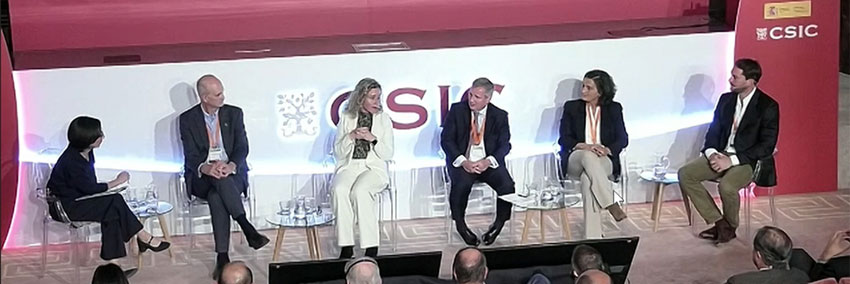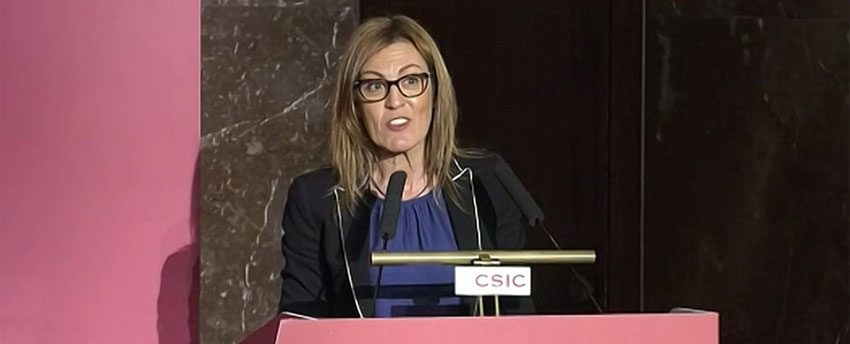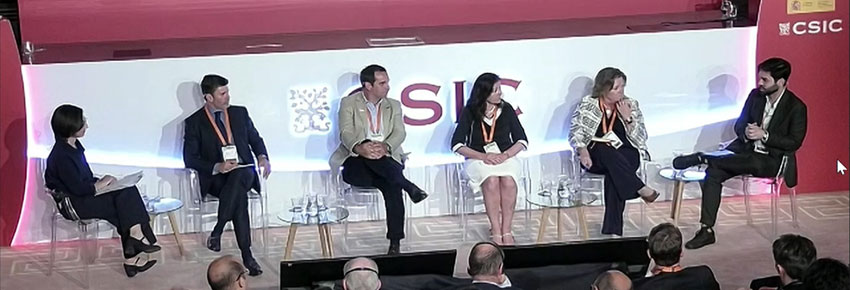2023 Regional Event Spain event summary
Tuesday, Jul 18, 2023
Madrid was the venue for our latest regional event, ahead of Spain taking the Presidency of the Council of the European Union. The opening session set the scene for the panel discussions to follow, with messages from a wide variety of stakeholders.
Moderator and agricultural journalist Elisa Plumed kicked off by thanking the hosts, the Spanish National Research Council (CSIC). CSIC is the largest public research institution in Spain and one of the most renowned institutions in the European Research Area.
More on CSIC came from Elena Cartea González, Vice President, Scientific and Technical Areas, as she welcomed delegates. With thousands of employees including researchers, headquarters in Madrid, 121 institutes and national centres in Spain, and centres in Rome and Brussels, CSIC’s mission is to improve scientific and technical research. Ms González highlighted the focus on sustainable agriculture, from biotechnology, soil fertility and sustainable production to agricultural policies, economic analysis and food systems.
Focusing on forests
Forests are a key part of that sustainability and will be a particular focus for the Spanish Presidency. That was the message from Hugo Morán Fernández, Secretary of State for the Environment in the Spanish Ministry of Ecological Transition and Demographic Challenge. The European Union represents 5% of the world’s total forests and landowners are essential players – in Spain, for example, 70% of forest land is privately held.
The EU’s forest strategy is integral to policies on climate change, the environment, the bioeconomy and the circular economy. The Spanish Presidency will aim to improve coordination with EU countries on forest-related matters, specifically asking Member States to focus in depth on EU forestry legislation and governance. “We hope we will include all of you in order to achieve the goals successfully,” he ended.
The role of landowners as part of the solution
What role exactly do landowners play? Gabriel Lodares, Vice President of the European Landowners’ Organization, posed this question. The voice of these mostly family-run companies must be heard when it comes to transforming agriculture. Landowners are often blamed for being emitters of CO2 and methane, and producing meat which some see as unhealthy, yet they are very much part of the solution. And landowners are under threat themselves, faced by rising prices and rural depopulation. But everything that Europe wants to achieve through the Green Deal is in their DNA. “We need to adapt to the new reality, and landowners play a major role in this.”
Making progress in the EU
The good news is that Europe and the Green Deal are making progress – and there is concrete evidence of that. Catherine Geslain-Lanéelle, Director Strategy and Policy Analysis at DG AGRI, European Commission, gave the delegates an update. Criticism is sometimes levelled that the Green Deal is not moving ahead, she said. Yet there is evidence to the contrary: for example, the new Common Agricultural Policy has been adopted, as has regulation on deforestation; an action plan on organic farming is under way, and the sustainable use regulation to reduce pesticides is being discussed. She highlighted that transition in agriculture also relies on funding and it is not just about the Common Agricultural Policy, (CAP) but also a need for other investment at farm level and in the food chain. One aspect that could be very helpful is carbon farming.
In a special video recording, Daniel Calleja Crespo, Director-General, DG Legal Service, European Commission explained, “We are at a decisive moment for the EU and for our planet,”. He described how agriculture has a key role to play and is itself facing crucial challenges. “I would like to reaffirm the EU’s commitment to design, to promote and to develop policies that support innovation and the transformation of the agricultural sector.”
Fixing tomorrow, today
To wrap up the first session, Janez Potočnik, Chairman of the Forum for the Future of Agriculture, Chairman RISE Foundation and Co-Chair of the International Resource Panel of the United Nations Environment Programme (UNEP) spoke with Mark Titterington, Senior Adviser, Strategy & Partnerships, Forum for the Future of Agriculture.
Fixing tomorrow, today was the theme of the ForumforAg annual conference and Mr Potočnik returned to it. Economies have been organized in a wasteful way: the challenge is to change to meet human needs and maximize well-being in the most energy and resource efficient way, he said.
How do we go about that? Start by re-ordering our priorities so that the economy serves humans and not vice versa. See humans as part of nature, not external to it. Move from stimulating extraction-based models to promoting more innovation and creativity-based models. And change our system of governance. “We need to create an intergenerational agreement through which we would be able to address the questions which relate in particular to the future generation,” emphasized Mr Potočnik.
His final word was praise for the entrants to the Land and Soil Management Award. Not just the winners but all the entrants who have shown in concrete ways that they can change the world for the better.
Panel debate: Sustainable production increases trade?
How is Europe’s vision of agricultural sustainability affecting international trade? Is sustainable produce welcome in other countries? How do they view these policies? These questions opened the first panel discussion.
Sustainability is not negotiable, said Samuel Juárez Casado, Advisory Member of the General Secretariat for Agriculture and Food at the Spanish Ministry of Agriculture. And sustainably produced produce will have a competitive advantage in the future. One current issue is that there are no agreed standards internationally or even within the internal market. “There is still a lot of work to be done at the EU and international levels before sustainability attributes can make a difference.”
The international perspective was on the mind of Pedro Gallardo, a farmer and Vice President of COPA-COGECA, which represents farmers and cooperatives, as well as Vice President of ALAS (Alliance for Sustainable Agriculture). Europe cannot be an island because we live in a global world, he reminded delegates. With population growth, Europe will need to produce for third countries. But this will not be easy to achieve because, while Europe is fostering sustainability, it is not supporting farmers and cooperatives sufficiently. “We’ve always said it clearly: we can have greener agriculture if we have the money. Farmers have adapted but we truly need European legislation supporting us.”
Rosa Vañó is immersed in the trade in sustainable agriculture and highlighted the lack of credible consumer communication about sustainability. Founding Partner of Castillo de Canena, her business practices regenerative agriculture which produces olive oil that is then sold in more than 60 countries. One of the impediments to trade, she said, was lack of an undisputed green certification.
Will consumers pay for sustainability?
Another issue was the thorny question of whether consumers will pay more for differentiated products. This topic was taken up by María Cruz Vaca Escribano, Director of Economic Affairs, ANGED, an organization representing large distribution companies. If asked whether they will pay more, consumers say yes – but when you drill down into the data, the most important factor for them is price. “We need to be efficient enough so we can offer differentiated quality, sustainability and an attractive price,” she concluded.
The panel considered the wider perspective of how the rest of the world sees the Green Deal. The view from Brazil came from Bruno Capuzzi, Policy Officer at ApexBrasil, the Brazilian Trade and Investment Promotion Agency. He pointed out that the Green Deal is outward looking, and it tries to influence the preservation of the environment in a holistic way. Nevertheless, countries are fully entitled to regulate their imports to preserve animal life and plant health as agreed in the rules-based trading system. So there will need to be many more discussions when it gets closer to implementation.
This brought up the topic of “mirror clauses”, which aim to guarantee that imported products are produced under the same social and environmental standards as EU products, and the need to ensure that producers are competing on a level playing field. Are mirror clauses feasible, asked the Moderator, a question which sparked intense discussion.
Pedro Gallardo was clear: “We cannot play soccer with different rules.” He highlighted that substances that are banned in Spain can be permitted in African countries, and this denies Spanish farmers the means to fight certain pests and diseases. Spanish farmers have seen cereal prices decrease due to imports produced with substances banned in the EU.
Lawmakers legislate without listening closely enough to farmers – “going to the fields”, as he put it. “The industry is not being heard when the law is made, and I would like to see some degree of understanding from Brussels.”
Rosa Vañó agreed that “we need to be careful in order not to harm ourselves”.
Everyone is facing a common challenge
Countering the earlier points, Samuel Juárez Casado reiterated that it is not the intention of the CAP to create difficulties or obstacles for farmers. Quite the reverse, the goal is to help them be more productive in the long term, with fewer instruments, fewer tools, and everything central to the idea of feeding the population while generating a worthy income for farmers.
Bruno Capuzzi commented that while buyers and sellers are on opposite sides, they are all facing the same challenges of preserving the environment. “If I create barriers, any standard that cannot be met by my suppliers, I may risk their well-being and my well-being. The buyers and the sellers are part of the solution.” Farmers are among those who are part of the solution and need to be listened to as they will be the ones who have to comply with regulations to achieve a more sustainable way of trade. “How to make trade greener? Science and complementarity,” he finished.
The panel debate ended with a short discussion about the US Inflation Reduction Act and its fiscal incentives based on increased productivity through science – a philosophy which Europe shares. Questions from the audience completed the first panel session.
Panel debate: Improving biodiversity & water resilience & soil through farming – What role for regenerative agriculture?

What is regenerative agriculture? The session began with the panellists’ views as a way to identify common thinking.
Ernesto Igartua Arregui, a biologist and Coordinator for the subarea of Agricultural Sciences and Technologies at CSIC, kicked off: “An agriculture that not only thinks about production but also has the goal to improve the environment. That is easy to say, but difficult to do.”
That definition was echoed by Mónica Andrés Enríquez, EVP Europe, Yara International. Regenerative agriculture is about transforming agriculture and the entire food chain by providing solutions that include nature in every decision made to give more value-added impact.
Robert Renwick, Head Business Sustainability EAME, Syngenta Crop Protection, built on these contributions, explaining that “regenerative agriculture is an evolution of an agriculture that has long been practiced”. Its approach is to focus on soil health, protection of biodiversity and better use of natural resources. In the long term, it is about protecting the soil and also profitability for farmers. Innovation is also important: as well as agronomic practices like sowing cover crops and incorporating livestock, regenerative agriculture includes precision application techniques. He concluded: “All this is applicable to every farmer, not only organic farms, but they need advice and practical support, like finance, as well as the tools.”
Everyone needs to be aware of regenerative agriculture
Picking up the theme, Ana Rengifo Abbad, a biologist, conservationist and a founder of Islas de Corcho Natural (Natural Cork Islands), said there is a need to raise awareness about all these practices and tools, so that everybody has the means to practice regenerative agriculture.
Speaking as a farm operations manager, on a family farm in a depopulated rural area of southern Spain where conditions are dry, Alfonso Chico de Guzmán said regenerative agriculture is about taking actions that can improve water and biodiversity. Practices vary because there are different ways of achieving that. What is common to all crops is to try to generate returns: obviously it is essential to have an economic return, but also environmental returns such as restoration of ecosystems and reforestation, and social returns, like trying to repopulate the area.
Turning to the land he manages at La Junquera, he said rainfall has fallen dramatically. Among the practices used in mitigation are the creation of ponds and ditches, applying compost, and encouraging biodiversity through planting hedges of trees, bushes, and aromatic plants.
Regenerative agriculture can tackle climate change
The topic of declining rainfall resonated with the panel and the audience – severe droughts have had a devastating effect on Spanish harvests, including this season. Regenerative agriculture can help mitigate both lack of rainfall and soil erosion, they agreed, through promoting soil health. Ernesto Igartua Arregui summed up: “With regenerative agriculture, with the improvement in the soil, with diversification, we can tackle terrible situations such as we see this year.”
The panellists acknowledged that farmers are the first to be impacted by climate change, especially water scarcity, flooding or extremes of temperature. What tools are companies making available to them, asked the Moderator.
At Yara, said Mónica Andrés Enríquez, the goal is to help farmers make decisions by providing them with digital technology and tools. One example is a digital tool that uses satellite imagery to help farmers determine the amount of nutrients needed by the crops in any given area of a field – perhaps even communicating directly to the tractor. This also brings savings for the farmer.
Robert Renwick of Syngenta said land can be “as hard as cement” in summer but there are effective tools to help preserve the humidity. They also allow rainfall to be absorbed by the soil in a way that does not displace the land. One example is cover crops, made up of different mixtures of seeds chosen to be suitable for different regions and conditions. Technology is also an answer. In the United States, Syngenta provides farmers with a digital tool that scans soil for 27 different parameters, from micro-nutrients to CO2, carbon and organic matter. With this deep view into the soil and its microbiome, Syngenta can design a customised plan for applications, fertilizers, or seeds that can adapted to every square metre of the plot.
The structure of the soil is also very important in helping it absorb water, contributed Ana Rengifo Abbad. Pollinators provide one natural method of improving the structure of the soil when they deposit pollen and nectar below ground.
Sustainability adds value for farmers
Is there added economic value for farmers in ecologically friendly measures? Can they even equal conventional farming? Robert Renwick shared a case in which one farmer had saved euros 85 per hectare on fodder and phytosanitary products. Alfonso Chico de Guzmán confirmed that on the farm he manages, production this year reached the average for conventional farms in his area.
Coming to the end of the session, the panel looked from the present towards the future. Artificial intelligence is a topic of the moment, and Robert Renwick could see how it could be incorporated into an exciting digital future. “Digital tools are going to be increasingly implemented and have a more important role on farms, for example, with artificial intelligence to interpret data, to give more advice, and machinery that can assess factors according to climate,” he concluded.
Closing conclusions: optimism, frustrations and the need for concrete action
Where have we got to in the transition that our food system needs, to one that produces healthy and affordable food with regard for the environment that produces that food? A stimulating closing conversation between Alberto Arroyo, Head of Policy and Programme at the IUCN European Regional Office, and Mark Titterington, Senior Adviser, Strategy & Partnerships, Forum for the Future of Agriculture, highlighted the main takeaways.
They agreed that there is a sense of optimism around the transition, and that all the players are working towards the same objectives, even if not everyone agrees on the “how” of getting there. Regenerative agriculture is gaining momentum and it is accepted that there are a variety of practices that can all be considered as sustainable. Despite that there are some frustrations: the sector has not yet scaled up enough, it is not systematic in the way things are done, and discussion on policy and regulation have become increasingly polarized.
As Europe goes into the next phase of the reform of the CAP, it is important to stand back and ask what kind of a food and agricultural system we want. That also means having all the right people contributing to the debate, leading to a more comprehensive view of agriculture. What is also important is to start taking concrete action – and the recent Call to Action and update statement from the Forum for the Future of Agriculture are examples of that.
The full agenda and speakers for the event are available on the Spain Regional Event page.
Recordings from this event can be found on the Videos page.



